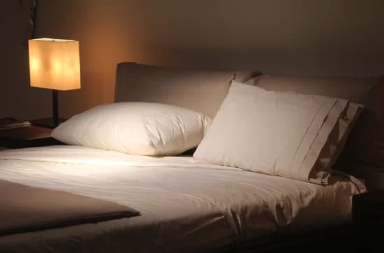How Sleep Impacts Your Workout Recovery and Performance
Struggling with muscle recovery or feeling sluggish during workouts? Paoli shares how sleep can be the missing piece in your fitness routine. In this post, she dives into the powerful connection between sleep and workout recovery, explains how better fitness can lead to better sleep, and offers her personal tips for improving sleep quality. Discover why rest is just as important as the time you spend in the gym!
5 min read


Hey, fit fam! Today, I want to dive into something I don’t think we talk enough about but is absolutely crucial to your fitness journey—sleep. I’ve learned over the years that while we put so much focus on the workouts, the nutrition, and even the gear we wear, sleep can be the game-changer you’re missing.
In my own journey, I used to think that as long as I was hitting the gym, pushing hard in spin class, and eating well, I was doing everything right. But, honestly? I was totally neglecting the power of rest. It wasn’t until I started paying attention to my sleep and how it affected my recovery that I truly started seeing the results I was after. So, let’s talk about why sleep is such a key player in your fitness and recovery, and how fitness, in turn, can lead to even better sleep.
Why Sleep is Essential for Recovery
You’ve heard it before: muscles aren’t built in the gym, they’re built during rest. And let me tell you, sleep is where the magic really happens! When you work out, you’re creating tiny tears in your muscle fibers, which is a good thing. But those muscles need time to repair and rebuild, and the most effective time for that process is when you’re asleep.
During sleep, especially deep sleep, your body is hard at work repairing those muscle fibers, replenishing energy stores, and releasing growth hormones that help build muscle and burn fat. Skimping on sleep means your body doesn’t get the recovery time it needs, which can lead to slower progress, more muscle soreness, and even an increased risk of injury. I can’t tell you how many times I’ve seen my performance dip simply because I wasn’t giving my body the rest it was craving.
For me, once I started prioritizing sleep—aiming for at least 7 to 8 hours a night—I noticed a huge difference. My muscles didn’t feel as sore, I had more energy for my classes, and I was able to push harder during my workouts. It was a reminder that rest is just as important as all the hard work I was putting in during the day.
The Impact of Poor Sleep on Performance
Now, let’s be real: we’ve all had those nights where we toss and turn and wake up feeling groggy. But here’s the thing: that lack of sleep doesn’t just affect your mood—it affects your performance big time.
When you’re sleep-deprived, your reaction time slows down, your endurance drops and your focus takes a serious hit. You might find yourself feeling unmotivated, struggling to keep up with your usual pace, or even feeling more winded during a workout. I’ve been there—those days where every pedal stroke in spin feels like a chore, and you’re counting down the minutes until class is over. It wasn’t until I connected the dots between poor sleep and those off days that I realized how much sleep was impacting my fitness.
On top of that, lack of sleep messes with your body’s ability to metabolize carbs and regulate hormones like cortisol and insulin. What does that mean? Well, it can make it harder to build muscle, recover, and even manage your weight. So, if you’re pushing yourself hard in your workouts but not seeing the results you’re expecting, it’s worth taking a look at your sleep habits.
How Better Fitness Leads to Better Sleep
Here’s the good news: it works both ways! Not only does sleep improve your recovery and performance, but better fitness can actually help you sleep better, too. When I’m consistent with my workouts, I notice that my sleep quality improves. My body feels more ready to rest, and I fall asleep faster, stay asleep longer, and wake up feeling refreshed.
Exercise has been shown to help regulate your circadian rhythm (your body’s natural sleep-wake cycle) and can also reduce stress and anxiety, which are often the culprits behind restless nights. I’ve found that on days when I’ve had a solid workout, especially a spin class or a strength-training session, I’m much more likely to fall asleep easily and stay asleep through the night.
And while intense workouts can tire you out in a good way, even lighter forms of exercise like yoga or stretching can improve your sleep quality by helping you relax and unwind. For me, this has been a game-changer. On days where I’m feeling more stressed, I’ve started incorporating more stretching or a quick yoga flow before bed, and it makes such a difference in helping me sleep more soundly.
Tips for Better Sleep to Enhance Your Fitness
Okay, so now we all know sleep is crucial for recovery and performance, but how do we make sure we’re getting enough of it? Here are a few things that have worked for me:
1. Create a Bedtime Routine
Just like you set aside time for your workouts, set aside time to wind down. Try to go to bed at the same time every night and establish a relaxing pre-bed routine. Whether it’s reading, journaling, or doing some light stretching, creating a habit can help signal to your body that it’s time to rest.
2. Limit Screen Time Before Bed
We’ve all heard this one, but it’s true. The blue light from phones and laptops can mess with your sleep hormones and make it harder to fall asleep. I will be very honest, I am NOT good at this one, but I'm making a real effort to put my phone down earlier...and while I hate to admit it, it does make a difference. Try putting your phone on “Do Not Disturb” about an hour before bed. See what happens!
3. Watch What You Eat and Drink
Try not to eat a heavy meal too close to bedtime and do not drink caffeine after mid-afternoon. As much as I love my coffee, I never, ever, have caffeine after 1-2pm. Your body needs time to digest, and caffeine can keep you wired when you’re trying to wind down. Instead, opt for a light snack if you’re hungry or a cup of herbal tea to help relax.
4. Keep Your Room Cool and Dark
A comfortable sleep environment is key. I keep my room cool and as dark as possible. It definitely helps me sleep more deeply. There isn't much worse than trying to sleep when you are hot. Invest in some blackout curtains if light bothers you, and set the thermostat to a cool temperature.
5. Stay Consistent with Your Workouts
Regular exercise can improve sleep quality, but try not to work out too close to bedtime as it may leave you feeling too energized to fall asleep right away. Find a workout routine that works for you, whether it’s morning, afternoon, or earlier in the evening.
At the end of the day, sleep and fitness go hand in hand. If you’re looking to improve your performance, recover faster, and feel better overall, prioritizing sleep is non-negotiable. It’s not just about working harder in the gym—it’s about giving your body the time it needs to repair and rebuild.
If you’ve been struggling with your recovery or performance lately, take a look at your sleep habits. And if you have any questions or need tips on how to improve your rest, feel free to reach out—I’m always here to help. Now go get those Zzz’s and keep crushing your goals!
As always, thank you so much for spending a few minutes of your time with me today! Don’t forget to check out my Class Schedule for all my upcoming locations and times — I’d love to see you in class! And if you’re curious about any of my go-to products or recommendations, head over to the My Favorites page where I answer all your most frequently asked questions about what I use and love. Until next time...
...stay happy and healthy!
Revolutionize Your Fitness, Ignite Your Soul
Ignite your passion, fuel your spirit, and empower you to become the strongest version of yourself.
© 2024. All rights reserved.
Instagram:
Grab My Free Building Confidence Through Fitness eBook Now
Some links throughout this site are affiliate/referral links.
